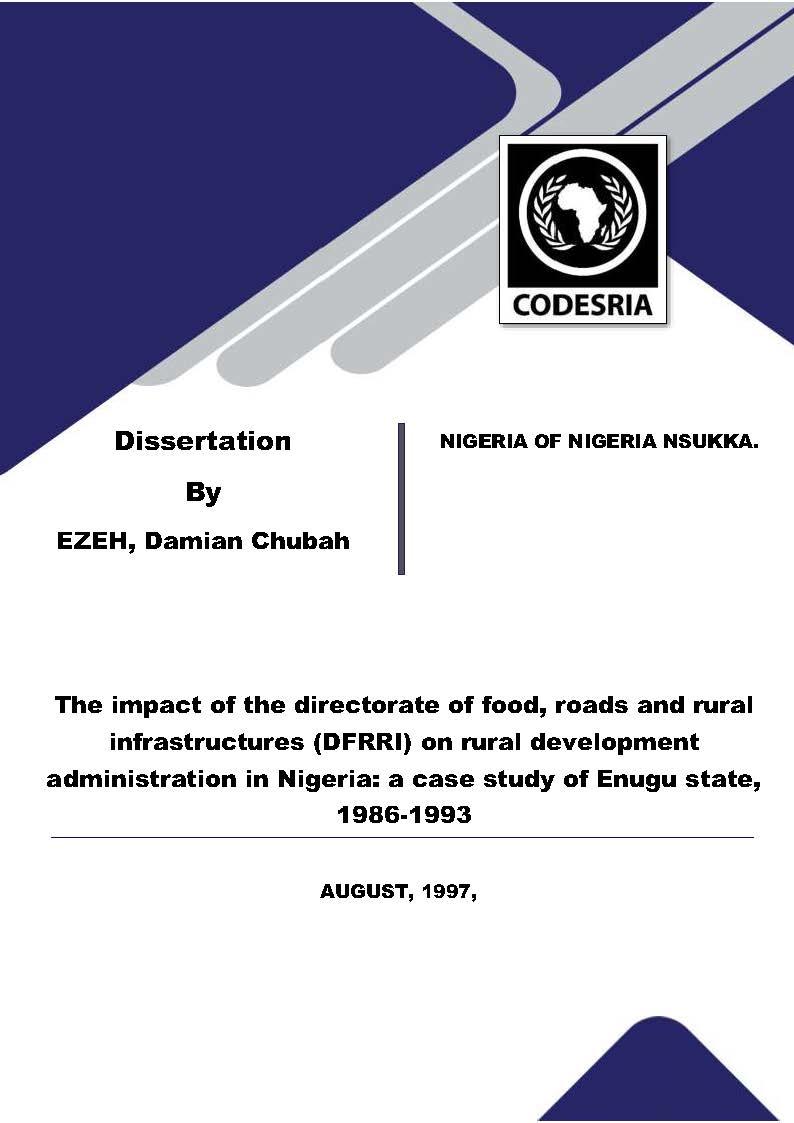The impact of the directorate of food, roads and rural infrastructures (DFRRI) on rural development administration in Nigeria: a case study of Enugu state, 1986-1993
Mots-clés :
impact, food, rural infrastructures, development administration, 1986-1993Synopsis
The main objective of this study is to make an in-depth empirical study aimed at ascertaining the impact of the directorate of Foods, Roads and Rural Infrastructure (DFRRI) on rural development administration in Nigeria. To accomplish this task, Enugu State with a total of two hundred and forty nine (249) autonomous communities
was chosen as the area for the case study. Our choice for Enugu State is based on the deep-seated development consciousness of the people of the state and their receptivity to government sponsored rural development efforts such as DFRRI. The efficiency and effectiveness ofDFRRI as an instrument of rural development in the state was critically ex-rayed in this study through extensive inquiry into its activities as it affects rural roads, water supply, electricity and general enhancement of agricultural productivity. We also identified the problems which act as obstacles to rural development role ofDFRRI. The data collection methods used are analysis of records, and documents, field observation of the directorate's projects in the state, interviews of members of staff of the directorate as well as some community leaders, distribution of questionnaires to a representative sample of the community leaders of some autonomous communities in the state and the directorate's senior members of staff in the state. Our findings show that the Directorate of Foods, Roads and Rural Infrastructure (DFRRI) has not made any remarkable impact in the area of rural development such as the construction of access roads, provision of portable drinking water, electrification of the rural areas ofEnugu State as well as general enhancement of agricultural productivity in the state. We also found that the inability of the directorate to accomplish its rural development aspirations is as a result of obvious constraints ranging from poor finances, lack of qualified manpower and tools, poor ideological under pinnings to apathy to participation on the part of the rural dwellers facing it.
Téléchargements
Références
Atte, O.D. (1986) "Overcoming Rural Underdevelopment in Nigeria", The Quarterly Journal of Administration, Vol. XX Nos. 3 & 4.
Akinbode, I.A. (1986) "A Perspective on Rural Development in Nigeria", The Quarterly Journal of Administration, Vol. XX:Nos. 3 & 4.
Ezeani, E.O. (1990) "the Directorate of Food, Roads and Rural Infrastructure
(DFRRI) and Rural Development in Nigeria". Being a paper presented at a National
Conference on Rural· Development and Rural Transformation Strategies and
Prospects: O.A.U 8"12th July.
Ibid.
Mtioghalu, N. (1992) "The Task Force Approach to Rural Development in Nigeria" in Olisa, S.O. and Obiukwu J.I. (eds). Rural Dev. in Nig. Dynamics and Strategies: Awka: Mekslink Pub.
Ezeani, E.O. op cit.
Nnoli, 0. (1981) ed. Path to Nigerian Development: Dakar: Codesria.
Awojobi, A. (1981). Nigeria Today: London; John West Publication.
Igbozurika, N.M. (1987) "Social Sciences in Rural Nigeria: Location and Accessibility" in Igbozurike et al (eds) Rural Nigeria: Development and Quality of Life: Ibadan Oxford University Press.






